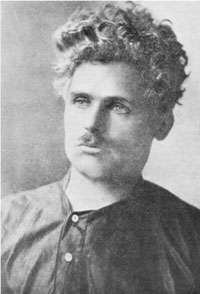Timofei Sapronov

Timofei Vladimirovich Sapronov (Russian: Тимофе́й Влади́мирович Сапро́нов; 1887 – September 28, 1937) was a Russian revolutionary, Old Bolshevik and socialist militant.
Life and career
Sapronov was born in Mostaushka, Tula Governorate in a family of Russian ethnicity. Whilst working as a house painter Sapronov joined the Bolshevik faction of the Russian Social Democratic Labour Party in 1912. He was active during the Russian Revolution and Russian Civil War in the Moscow Provincial Soviet. Sapronov was a left communist of the Bukharin group in 1918. Shortly afterwards, with other Moscow Communist Party left-wingers Vladimir Smirnov and Valerian Obolensky-Ossinsky, he initiated the inner-party grouping known as the Group of Democratic Centralism which presented its case at the Eighth Party Congress in 1919 that 'the party should not impose its will on the soviets’. However it obtained only a derisory number of votes and was denounced as semi-syndicalist by Vladimir Lenin.

The Democratic Centralists continued to campaign against the bureaucratic methods of the party throughout the early twenties as part of the so-called 1923 opposition. Despite this Sapronov remained a leading party figure and chairman of the Public Works Committee, a member of the Central Executive Committee and was a pall-bearer at Lenin's funeral. He, along with Osinsky, Smirnov and Drobnis, signed The Declaration of 46 and later adhered to the Left Opposition, albeit as a separate grouping considered ultra-left within it. Sapronov helped lay the groundwork for the United Opposition of the Trotskyist and Zinovite factions in 1926, but he and the former Democratic Centralists remained ultra-left, declaring in the statement of the Group of 15 that the Soviet Union was no longer a workers' state and that capitalism had been restored. They also ‘denied the necessity for the defense of the Soviet Union’ according to Leon Trotsky addressing the Dewey Commission.
Sapronov was expelled from the party at the fifteenth Party Congress in December 1927 with the rest of the inner party opposition and was deported to the Crimea. The circumstances of his capitulation to Joseph Stalin in 1928 remain unclear but he was rearrested in 1932 and spent the rest of his life in prison, most notably in the notorious Verkhneuralsk isolator. He was sentenced to death on 28 September 1937 and executed the same day.
References
- [ Documents of the 1923 opposition]
- The Case of Leon Trotsky Report of Hearings on the Charges Made Against Him in the Moscow Trials by the Preliminary Commission of Inquiry into the Charges Made Against Trotsky in the Moscow Trials 1937
- Pierre Broue 1971: The History of the Bolshevik Party (CP) of the U.S.S.R
- Ante Ciliga The Russian Enigma
- V. I. Lenin, Collected Works: Telegram from V. I. Lenin To G. D. Tsyurupa 1921, Telegram To T.V Sapronov 1919, Tenth Congress of the R.C.P.(B.)1921, Ninth Congress of the R.C.P.(B.) 1920, The Party Crisis 1920
- Max Shachtman 1937: [ Introduction to The Stalinist School of Falsification by Leon Trotsky]
- Leon Trotsky 1930: My Life.
- Fifteenth Congress of the CPSU (Bolshevik) in The Great Soviet Encyclopedia, 3rd Edition (1970-1979)